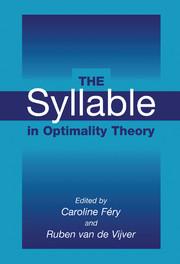
-
Select format
-
- Publisher:
- Cambridge University Press
- Publication date:
- 03 July 2009
- 27 January 2003
- ISBN:
- 9780511497926
- 9780521772624
- 9780521087889
- Dimensions:
- (228 x 152 mm)
- Weight & Pages:
- 0.691kg, 428 Pages
- Dimensions:
- (228 x 152 mm)
- Weight & Pages:
- 0.63kg, 428 Pages
- Subjects:
- Phonetics and Phonology, Language and Linguistics
You may already have access via personal or institutional login- Subjects:
- Phonetics and Phonology, Language and Linguistics
Book description
The syllable has always been a key concept in generative linguistics: the rules, representations, parameters, or constraints posited in diverse frameworks of theoretical phonology and morphology all make reference to this fundamental unit of prosodic structure. No less central to the field is Optimality Theory, an approach developed within (morpho-)phonology in the early 1990s. This 2003 book combines two themes of central importance to linguists and their mutual relevance in recent research. It provides an overview of the role of the syllable in OT and ways in which problems that relate to the analysis of syllable structure can be solved in OT. The contributions to the book not only show that the syllable sheds light on certain properties of OT itself, they also demonstrate that OT is capable of describing and adequately analyzing many issues that are problematic in other theories. The analyses are based on a wealth of languages.
Reviews
Review of the hardback:‘... There is much to admire in this book … It is well worth the time and energy necessary to read and digest it, and will hopefully find the wide readership it deserves.'
Source: Comptes Rendus
Contents
Metrics
Altmetric attention score
Full text views
Full text views help Loading metrics...
Loading metrics...
* Views captured on Cambridge Core between #date#. This data will be updated every 24 hours.
Usage data cannot currently be displayed.
Accessibility standard: Unknown
Why this information is here
This section outlines the accessibility features of this content - including support for screen readers, full keyboard navigation and high-contrast display options. This may not be relevant for you.
Accessibility Information
Accessibility compliance for the PDF of this book is currently unknown and may be updated in the future.


